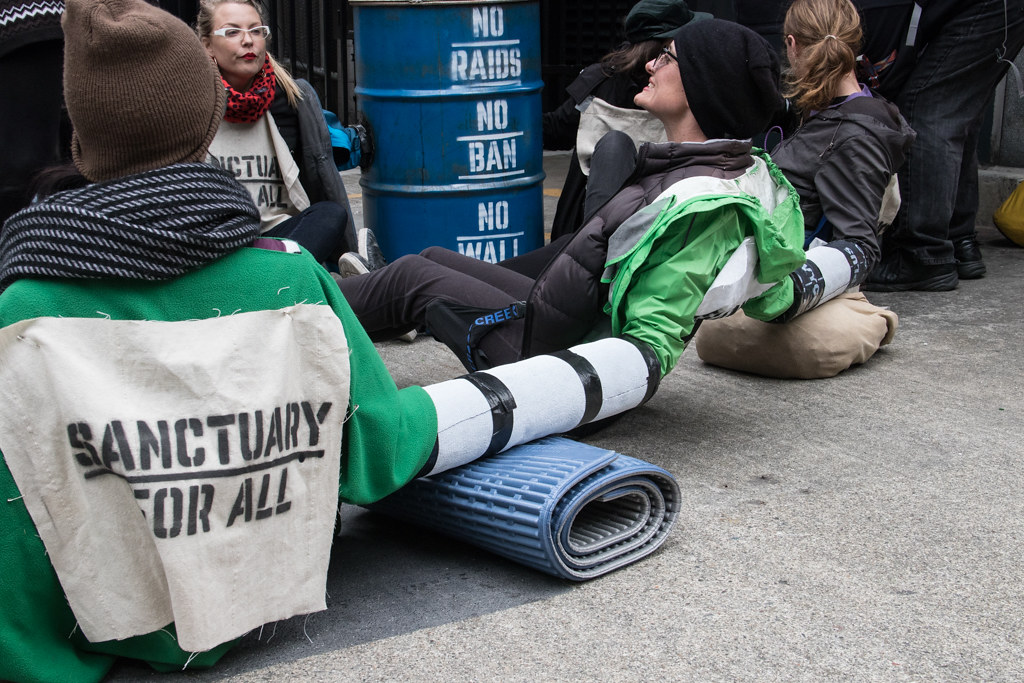Helicopters circled low over neighborhoods, federal agents swept into homes at dawn, and traffic stops clogged busy intersections as immigration raids expanded across Chicago and its suburbs this week. The actions are part of Operation Midway Blitz, a Trump administration initiative now unfolding in Chicago and Boston, targeting undocumented immigrants with criminal records. The Department of Homeland Security (DHS) described the effort as a direct challenge to Illinois’ sanctuary city policies: “Operation Midway Blitz is aimed at ‘criminal illegal aliens who flocked to Chicago and Illinois because they knew Governor J.B. Pritzker and his sanctuary policies would protect them and allow them to roam free on American streets,’” according to CNN.
Immigration and Customs Enforcement (ICE) confirmed approximately four arrests over the weekend, though Chicago councilwoman Jeylú Gutiérrez said five people had been detained, including a flora vendor and another individual waiting for the bus. “This proves the arrests are aimed at terrorizing our community rather than to go after criminals,” Gutiérrez said, according to CNN.
President Donald Trump and his advisers have leaned into the operation as part of a broader strategy. “You can expect action in most sanctuary cities across the country,” Tom Homan, Trump’s border czar, said Sunday, reported by CNN. The president himself added fuel to speculation about a National Guard deployment, calling Chicago “a very dangerous place” and saying he could “solve Chicago very quickly.”
Governor Pritzker accused the administration of politicizing enforcement. “This isn’t about fighting crime. That requires support and coordination—yet we’ve experienced nothing like that,” he said, adding that the state often learns of raids through social media rather than federal channels, according to CNN. Senator Dick Durbin, the state’s senior Democrat, called the enforcement operations “a waste of money [which] stokes fear and represents another failed attempt at a distraction.”
The controversy gained emotional weight after the DHS said the blitz was being launched in memory of Katie Abraham, a 20-year-old college student killed in a drunk-driving incident involving a previously deported migrant. Her father, Joe Abraham, welcomed the recognition. “I was just happy someone acknowledged Katie, unlike anyone here in Illinois,” he said, according to CNN. “Such a beautiful soul isn’t worth one criminal. Don’t tell me the stuff that you can’t do anything about it. Set up a process. Vet people.”
In Chicago’s neighborhoods, the effects were immediate. In Pilsen, where Mexican Independence Day normally brings parades, food vendors, and street festivals, crowds thinned under the watch of circling helicopters. Residents sported orange whistles around their necks, should federal agents appear. “We walked these streets until midnight, playing in the fire hydrant, going through the alleys. Now, people are afraid to even step outside,” said Laura Hernandez, 59, a Pilsen resident, according to The New York Times. Others said the moment calls for resilience. “I think now more than ever is when we need to demonstrate that we are united and we are a community,” said longtime resident Araceli Lucio, according to CNN.
The heightened tensions also spilled into the suburbs. In Wauconda, northwest of Chicago, the Latino Heritage Festival was canceled due to “immigration concerns in our area,” according to local police, reported by CNN. Trump officials have not ruled out bringing in the National Guard. “We used them in Los Angeles, and we used them in Washington, DC. They’re a force multiplier,” Homan said. Governor Pritzker said he is prepared for a court fight if troops are sent without state approval, according to the Illinois State Bar Association.
As the federal presence builds, the city remains caught between competing forces: a White House determined to showcase toughness on immigration and local leaders who say the raids are eroding trust. For residents like Carlo Romano, 52, the debate feels endless. “Democrats throw the ball to Republicans, and Republicans throw the ball to Democrats, and there’s no concrete solution to the problem,” he said, reported by The New York Times.








